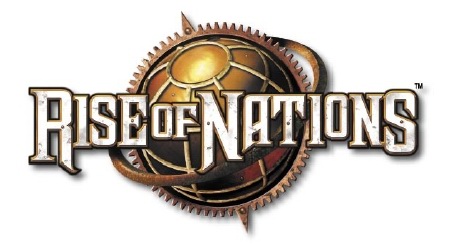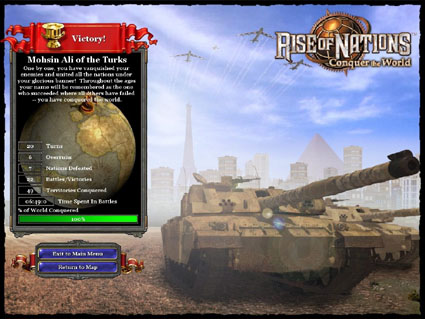Page 1
System Requirements:  CPU: 500 MHz or greater.
CPU: 500 MHz or greater.
RAM: 128MB RAM.
Video Card: 16 MB card.
Operating Systems: Windows98/ME/2000/XP. 
Test System:
CPU: Pentium 4 2.2GHz
RAM: 512 MB (PC 2100)
Video Card: Geforce4 MX440 64MB
Operating System: Windows XP Professional Ed.
If we take Sid Meier's Civilization on one side and a real time strategy game like Age of Empires on the other side and then we successfully embed them into each other, that is what Rise of Nations is all about. Rise of Nations not only gives the opportunity to build a city and do researches there and bring advancements in many fields like civics, sciences, military, etc, but at the same time it puts you on the command of a full fledge military that ranges from a spearman to machine gunner. The game is without any doubt not easy when you play at higher difficulty levels as you have to manage several things at the same time. One thing being the development of your city, other being the expansion of your nation by building cities nearby, and the last one is to maintain an army that can easily overcome different attacks that your enemy had initiated on different your cities. And when you are managing all of these things at the same time you have to research at libraries for which you require resources and one of new resources introduced in Rise of Nations is Knowledge, you build universities and then train scholars/scientists there to gain knowledge.
The game includes many ages, there are total of seven ages. And after you have researched the final age then you are given some future technologies which includes Missile Shield, Artificial Intelligence, etc. The second age is the Classical Age and the seventh age is the Information Age. The research for these ages and other advancements are held in the Library. And as you advance, you get more options, like advancing in civics gives you the option to build more cities and carry more population. The research in science gives you the option to build various buildings like granaries, timber mills, and more, these buildings then benefit in gathering resources faster.
One interesting thing is the fact that the game is not turn-based but yet it has some elements of it. The first element is the gathering of resources which is usually represented by ""amount of resource gathered /per/ 30 seconds"". This '30 seconds' is a standard time for you and your enemy, for example in gathering food, the more farms you have the more food you will be able to produce in 30 seconds, and if you have got granaries then this production will be increased by 20% in the cities where granaries are located. Everything is timed, and as time never stops, so it is just continuing and gives you and your foe equal opportunities to build cities, research technologies, train army, gather resources and then dominate the world but capturing cities.


